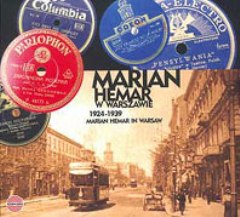Marian Hemar in Warsaw 1924 – 1939
Marian Hemar in Warsaw 1924 – 1939

01 So many cities 02 When the white lilacs bloom again 03 Is Mrs Martha 04 Pennsylvania 05 Remember me 06 Who else could 07 We've know each other too well, for too long 08 Little man 09 Save me Santa Madonna 10 I wish I could but I am scared 11 The handsome gigolo 12 Give me this night 13 If only you knew 14 It's worth getting drunk 15 Won't kiss any but a cavalryman 16 An honour to a girl 17 For me it's no one else but you 18 Perhaps some other time 19 Who cares for our love 20 That little nothing 21 Do you know me little darling... 22 Nobody but you 23 A song medley from the movie 'Snow White' Lista piosenek po polsku: 1. ZOFIA TERNÉ - Tyle jest miast (music: Natio Herb Brown), rec. 1976 2. ZOFIA TERNÉ - Kiedy znów zakwintą białe bzy (music: Franz Doelle) rec. 1958 3. STEFANIA GÓRSKA - Czy pani Marta (music: Franz Doelle) rec. 1958 4. SŁAWA PRZYBYLSKA - Pensylwania [z przedstawienia "Artyści"] (music: R.A.King) rec. 1957 5. SŁAWA PRZYBYLSKA - Wspomnij mnie [z przedstawienia "Artyści"] (music: Ripp) rec. 1958 6. MARIA MODZELEWSKA - Kto inny nie umiałby (music: Mabel Wayne, orig. lyrics: Billy Rose) rec. 1930 7. OLGA KAMIEŃSKA - Za dawno, za dobrze się znamy (music: Jerzy Rosner) rec. 1934 8. KAZIMIERZ KRUKOWSKI - Mały mężczyzna - parodia piosenki "Mała kobietka" [z filmu "Csibi"] (music: Nikolaus Brodszky) rec. 1932/33 9. MARIA MODZELEWSKA - Santa Madonna (music: Galizzo), rec. 1928/29 10. MARIA MODZELEWSKA - Chciałabym, a boję sie [z rewii "Zjazd Centrośmiechu"] (music: Milton Ager), rec. 1930 11. TADEUSZ FALISZEWSKI - Piękny gigolo (music: Leonello Casucci), rec. 1930 12. HANKA BRZEZIŃSKA - Daruj mi noc (music: Leo Towers), rec. 1958 13. MIECZYSŁAW FOGG - Żebyś wiedziała [tango z Teatru "Banda"] (music: Fred Melodysta), rec. 1933 14. CHÓR JURANDA - Upić się warto (music: Marian Hemar, Paweł Asamowicz), rec. 1934 15. TADEUSZ FALISZEWSKI - Jak całować to ułana [z filmu "Śluby ułańskie"] (music: Marian Hemar), rec. 1934 16. MARIA MODZELEWSKA - Awans panny [piosenka tytułowa z filmu "Awans panny"] (music: Marian Hemar), rec. 1934 17. FRYDERYK JAROSY i LENA ŻELICHOWSKA - A ja nic, tylko Ty [duet z komedii muzycznej "Piosenka o Nadine"] (music: Edward Strauss, arr. by Tadeusz Artur Müller), rec. 1930s 18. ADAM WYSOCKI - Może kiedyś, innym razem [z filmu "Dwanaście krzeseł"] (music: Władysław Dan), rec. 1933 19. HANKA ORDONÓWNA - Kogo nasza miłość obchodzi (music: Marian Hemar), rec. 1932 20. HANKA ORDONÓWNA - Jakieś małe nic (music: Leon Boruński), rec. 1934 21. ANDRZEJ BOGUCKI - Czy Ty wiesz, moja mała [z Teatru "Banda"] (music and orig. lyrics: Fritz Rotter, Walter Jurmann), rec. 1967 22. ZOFIA TERNÉ - Nikt tylko ty (music and orig. lyrics: Arthur Johnston, Sam Coslow), rec. around 1933 23. JANINA GODLEWSKA - Wiązanka piosenek z filmu "Królewna Śnieżka" (music: Frank Churchil, orig. lyrics: Larry Morey), rec. 1939
Marian Hemar (1901-1972), an author of poems, songs and skits; a playwright, a composer, a director of theatrical plays; also - the director of a theatre. He wrote for Qui Pro Quo, Banda, Cyganeria, Morskie Oko, Cyrulik Warszawski, Ali Baba, Teatr Polski, Nowa Komedia and other theatres and stages in and outside Warsaw.
He was born on April 6, 1901 in Lvov (as Jan Marian Herscheles). It was in Lvov that his first songs were composed. Encouraged by his success in Lvov's cabarets (such as Ul, Renesans, Mozaika), he dreamed of a career in the capital. At the invitation of Jerzy Boczkowski, director of the legendary Qui Pro Quo Theatre, he left his home town for Warsaw in 1924.
On September 10, 1939 realising the impending danger, he left Poland in dramatic circumstances and took refuge in Romania. In 1940-41 he served as a soldier in the Polish Carpathian Brigade in Palestine and Egypt. From March 1942 he lived in London. He did not return to Poland after the war. He is called "the bard of Lvov, the troubadour of the London emigration". For 16 years (1953-1969) he prepared and presented weekly cabaret programmes for Radio Free Europe, in which - in prose and verse - he commented upon all the important news from post-war Poland, which also reached London. Satirical poems were interspersed with old and new songs, often recovered by a happy chance or traced and sent to him by listeners from Poland and from all over the world. In this way his own songs came back to him after many years, noted down, copied for old worn-out records. He would then recount in wonderment when and for whom they were written and first performed. And, although he claimed that "sentiments must needs be suppressed - especially in a cabaret..." he often admitted that he had his sentimental memories, when his own songs, which survived the ravages of war, profoundly moved him. "Like shipwrecked sailors, they were rescued from the world of pre-war theatres: Polski, Letni, Banda, Wegierko, Szyfman, the world of my music comedies..."
He estimated that before the outbreak of the war he had written 1200 songs. This album features 23 of the best.
Zmieniony (Wtorek, 08 Styczeń 2013 17:33)








